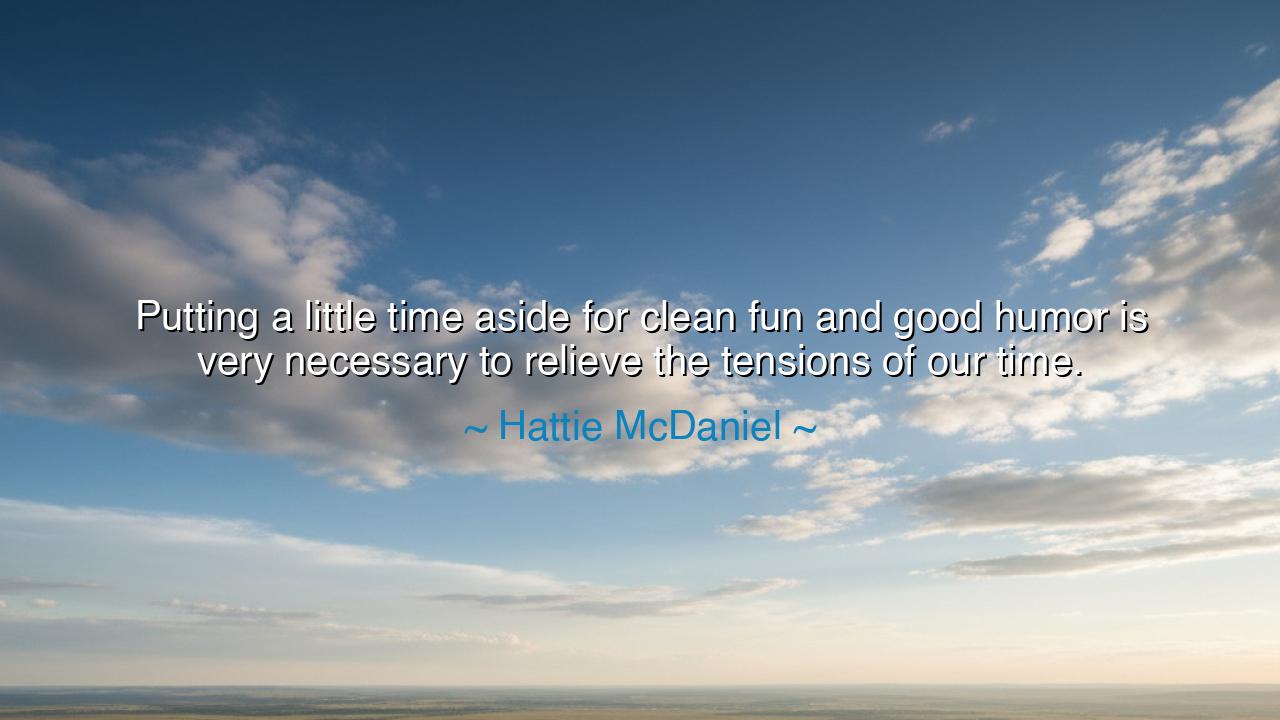
Putting a little time aside for clean fun and good humor is very
Putting a little time aside for clean fun and good humor is very necessary to relieve the tensions of our time.






The words “Putting a little time aside for clean fun and good humor is very necessary to relieve the tensions of our time” by Hattie McDaniel ring like a gentle hymn to the weary soul — a reminder that joy, in its purest form, is not a luxury, but a necessity. These words, spoken by a woman who lived through both personal hardship and public triumph, carry the weight of experience. McDaniel, the first African American to win an Academy Award, understood deeply the trials of her age — the heavy burdens of inequality, war, and social unrest. Yet even amidst such gravity, she recognized the sacred power of good humor — that simple, luminous gift that allows the heart to breathe again when the world grows too heavy to bear.
In her time, the 1930s and 1940s, America trembled beneath the weight of the Great Depression and the rumblings of global conflict. The world seemed consumed by fear and fatigue. Yet out of that darkness, artists like McDaniel brought laughter, music, and hope to millions. Her quote is not the naïve counsel of someone untouched by sorrow, but the hard-earned wisdom of one who knew suffering and still chose joy. When she spoke of “clean fun” — laughter untainted by cruelty or vice — she spoke of a balm for the collective spirit, a way to cleanse the bitterness that fear plants in the human heart.
To “relieve the tensions of our time” is to do more than distract oneself; it is to heal. Hattie McDaniel understood that tension is not only physical but spiritual — a tightening of the soul that comes when life’s pressures grow too strong. Humor, when pure, loosens that knot. It restores perspective. It reminds us that even in struggle, beauty remains, and that no burden can wholly crush a heart that still remembers how to laugh. Ancient philosophers knew this truth well. The Stoics, though sober in their discipline, taught that laughter was a form of wisdom — for it revealed the fleeting nature of misfortune. To laugh, they said, is to rise above circumstance, to declare, “You cannot own me.”
History is rich with moments where humor saved humanity from despair. During the darkest nights of the Second World War, when bombs fell over London, the people still gathered in shelters and sang, trading jokes amid the thunder of destruction. That laughter did not mock the horror; it defied it. It said, “We remain human, even now.” In that same spirit, McDaniel’s words call us to make time for light, even in seasons of shadow. For laughter, like light, must be kindled — and once kindled, it spreads warmth even in the coldest hearts.
Yet her emphasis on “clean fun” carries its own lesson — that joy need not be purchased at the expense of decency or others’ dignity. In an age where cynicism often masquerades as wit, McDaniel’s reminder is timeless. True humor does not divide; it unites. It is laughter that lifts rather than wounds, humor that heals rather than mocks. The ancients called this eutrapelia — the art of playful moderation — the ability to delight in life without losing one’s moral balance. McDaniel’s words echo that same virtue: laughter as an act of grace.
Her wisdom also carries an unspoken courage. As a Black woman in an era of harsh prejudice, she lived in a world that often denied her joy. Yet she refused to surrender it. Her laughter was a form of quiet rebellion — a declaration that no cruelty could steal her humanity. When she urges us to set time aside for fun and humor, she is reminding us not to let darkness dictate the terms of our spirit. Joy, to her, was not an escape from struggle; it was a weapon against it. It was strength disguised as laughter.
And so, dear listener, take this teaching to heart: do not neglect the sacred duty of joy. In times of fear, make room for laughter. In seasons of toil, allow yourself play. Guard your humor as you would your faith, for it is the heartbeat of the soul’s endurance. Laugh with kindness, live with lightness, and remember that the ability to find delight in simple things is not weakness — it is the highest form of wisdom. For as Hattie McDaniel teaches, the world’s tensions will always be with us, but so too will the power of laughter — that bright, eternal flame that keeps humanity alive through even its darkest hours.






AAdministratorAdministrator
Welcome, honored guests. Please leave a comment, we will respond soon